 |
|||||||||




 |
|||||||||




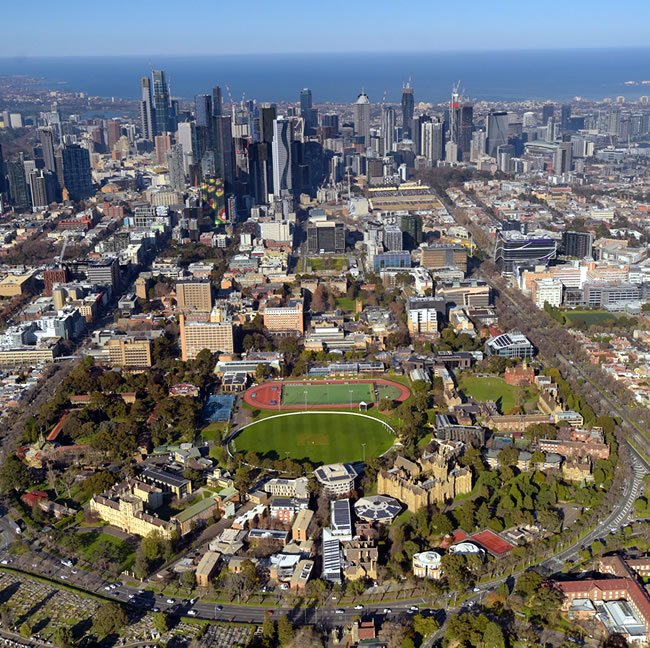
Photo: The University of Melbourne has been ranked as the 14th best university in the world. Image provided by the University of Melbourne.
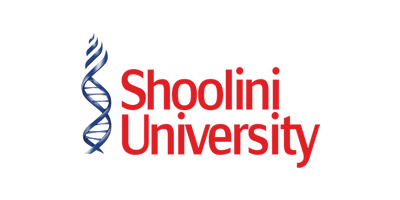
SOLAN, India, March 4, 2024 — Shoolini University has collaborated with the esteemed University of Melbourne to provide Indian students with international education opportunities. The admission process for the dual degree Bachelor of Science Advanced (Honours) program is currently in progress, and admissions will commence at Shoolini University on April 1.
Shoolini University has been recognized as India’s top-ranked private university by the QS and the Times Higher Education (THE) World University Rankings. Similarly, QS has ranked the University of Melbourne as the number one university in Australia in its World University Rankings. The partnership between these two universities has set new academic excellence and innovation standards, especially considering that the University of Melbourne has achieved the prestigious 14th position globally.
Last year, two universities signed a Memorandum of Understanding (MoU) to provide cutting-edge education to Indian students. This young talent pool will receive instruction and guidance from top-class faculty for the first two years of their education at Shoolini University and then continue their studies for the same period at the University of Melbourne.
The dual degree program begins with the Bachelor of Science Advanced (Honours) and offers students a world-class curriculum, opening doors to an exceptional global education experience. Indian students will enjoy the unique advantage of pursuing undergraduate science studies at Shoolini and the University of Melbourne.
The transformative journey starts with two years of study at Shoolini University and the remaining two years at Melbourne. Students can choose from various multidisciplinary majors in their third and fourth years, including Biochemistry and Molecular Biology, Cell and Development Biology, Chemistry, Climate and Weather, Ecosystem Science, Food Science, Geography, Physics, and Plant Science.
Shoolini Vice-Chancellor Professor Atul Khosla has expressed excitement about the partnership with the University of Melbourne. He said they are delighted to offer their outstanding undergraduate students from India more opportunities to study abroad. This collaboration highlights the global reputation of Shoolini University as a top-notch institution and broadens its students’ horizons.
The Dean of Science at the University of Melbourne, Prof Moira O’Bryan, expressed her delight in offering an international education to Shoolini students. She believes that this education will help prepare them for our globally connected world. The collaboration between the two universities will provide practical experience and a world-class education to many high-achieving Indian students to help them achieve their goals. The Bachelor of Science Advanced (Honours) dual degree program is now available, and the University of Melbourne is excited to welcome Indian students into the program.
Eligible students can extend their studies and complete a graduate program at the University of Melbourne, such as a Master of Science, with credit from their Advanced Honours program. It can reduce the study period for the additional qualification by up to a year, which is a great advantage. Furthermore, students who meet the Australian government criteria can apply for post-study work rights upon completing their studies in Australia.
The program’s curriculum reflects the rigorous standards the University of Melbourne upholds. Moreover, Shoolini University faculty members will visit Melbourne for practical training, fostering a more significant knowledge exchange between the two institutions.
Shoolini University and the University of Melbourne are paving the way for Indian students to access exceptional global education, fostering a new generation of highly skilled professionals prepared to thrive in today’s interconnected world.
According to Avnee Khosla, the Director of Admissions at Shoolini, only 30 seats will be available for dual degree admissions this year. It is a rare and excellent opportunity for students to pursue a high-quality pathway degree program from India to the highly-ranked University of Melbourne. Students will spend two years following the cutting-edge University of Melbourne curriculum at the Shoolini campus and continue their studies in Australia.
Associate Prof Rozy Dhanta, Deputy Director of International Affairs at Shoolini, said, “Collaboration with the University of Melbourne is not just about building partnerships but creating bridges of knowledge exchange that transcend borders, enriching both our institutions and the global community.”
Shoolini Research Professor Saurabh Kulshrestha, who has studied at premier institutions such as NIH, USA, and Max Planck, Germany, said that the dual degree program would provide ample opportunities for students who enroll.
Source: Shoolini University
|GlobalGiants.Com|
Edited & Posted by the Editor | 10:08 AM | View the original post
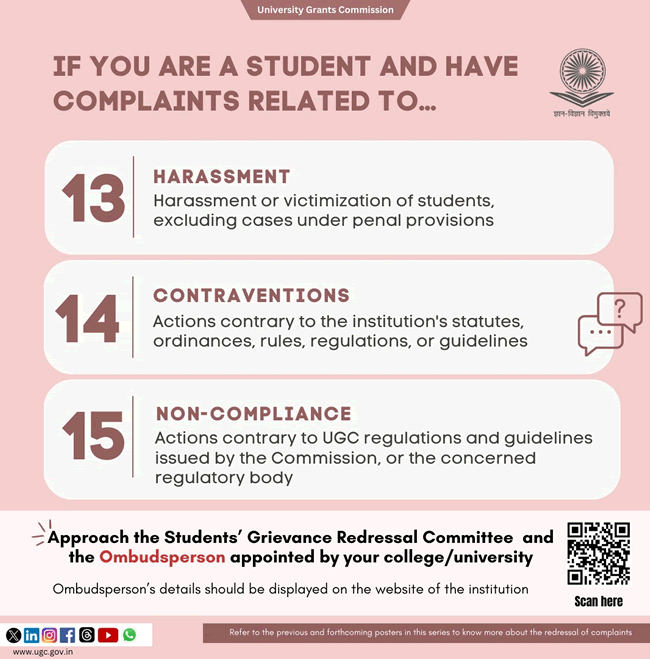
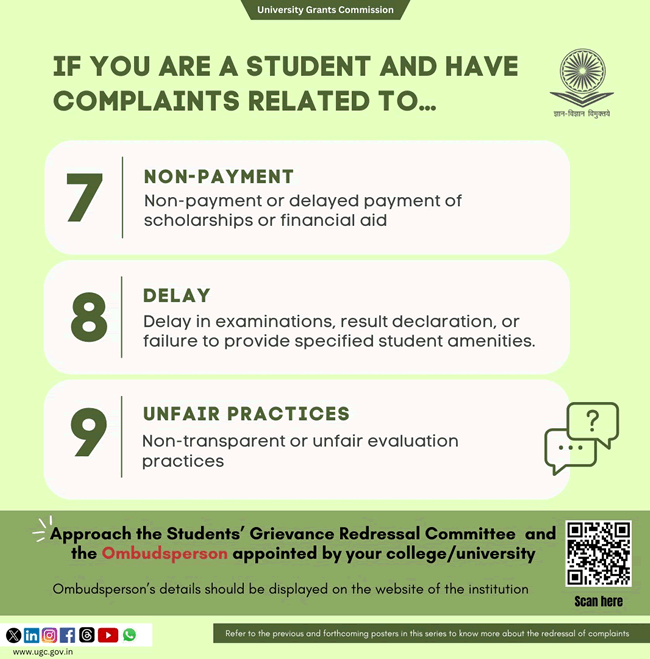
Photo: Two of the various Posters issued by the UGC for prominent display on the University and its affiliated college campuses.
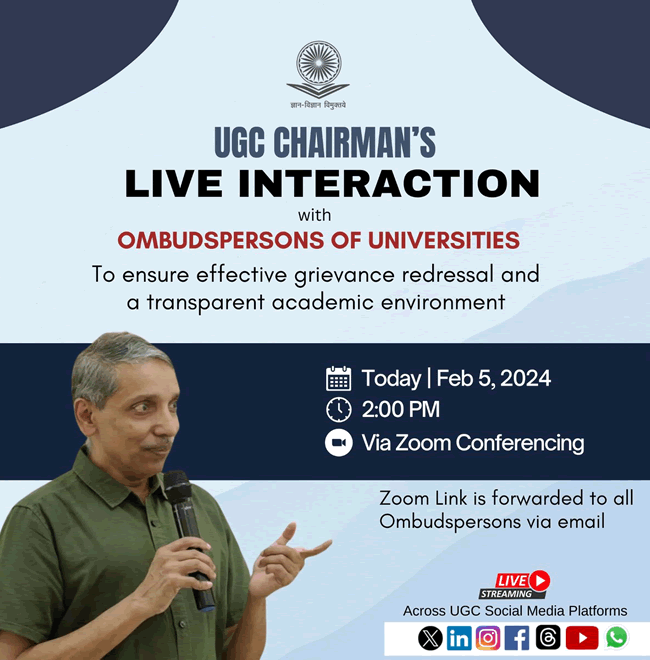
Photo: The UGC Chairman held a virtual meeting with all Ombudspersons on February 5, 2024.
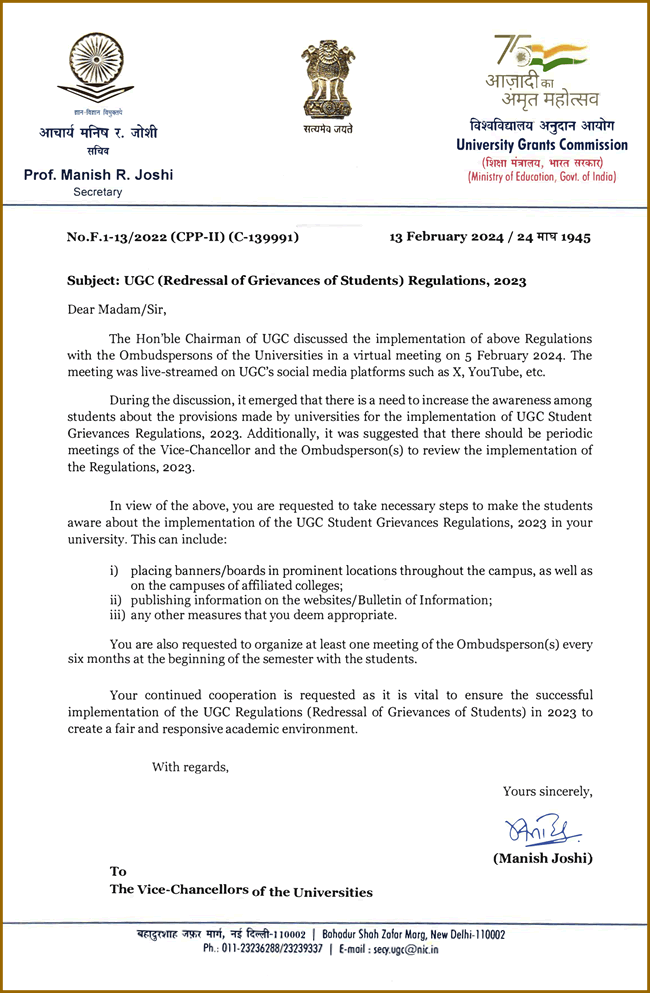
Photo: The University Grants Commission (UGC) in India has instructed Vice-Chancellors to prominently display the contact information of their Ombudspersons on campuses and affiliated colleges. Earlier, the UGC’s Chairman held a virtual meeting with all Ombudspersons.
Source: University Grants Commission
|GlobalGiants.Com|
— The Editor is a Higher Education Professional. and a Member of the American Association of University Administrators.
Edited & Posted by the Editor | 12:09 PM | View the original post

Abu Dhabi, February 20, 2024 — The member states of UNESCO have collectively adopted a new global Framework for Culture and Arts Education. As part of this Framework, the member states have committed to several initiatives, including prioritizing culture and arts education in teacher training, emphasizing local and indigenous cultures and heritage in the classroom, and recognizing artistic and cultural skills within the professional world.
“As a UNESCO study highlighted last year, arts education helps students develop emotional intelligence, creativity, and critical thinking. It improves their well-being and academic results. Artistic education also promotes openness to others and respect for diversity within society at large. I thank our Member States for this new global agreement, which will make culture and arts a greater priority in education while taking into account the use of digital technology,” UNESCO Director-General Audrey Azoulay stated.
The World Conference on Culture and Arts Education, organized by UNESCO and the United Arab Emirates in Abu Dhabi (13-15 February), brought together nearly 1,000 culture and education stakeholders - including 90 ministers, 125 representatives of UNESCO Member States, policy-makers, experts and NGOs, as well as UN agencies, academia, and the private sector.
The new UNESCO Framework emphasizes the importance of lifelong learning in culture and art in all educational settings. It also stresses the need to put culture and the arts at the core of education policies, strategies, curricula, and programs. The Framework has a broader definition of culture, including built, natural, and living heritage, cultural expressions, and the cultural and creative industries. Additionally, it focuses on the potential of digital technologies in culture and arts education to promote intercultural dialogue and linguistic diversity.
The adopted text also recognizes that learning with and through cultural diversity is crucial for creating mutual understanding and bridging divisions. It highlights the need to emphasize local and indigenous cultures and heritage. Furthermore, it calls for stronger relationships between educational and cultural institutions. It involves creating more partnerships between schools and cultural institutions, including UNESCO’s World Heritage sites and the cultures, traditions, and festivals inscribed on UNESCO’s List of Intangible Heritage of Humanity.
This Framework results from two years of consultations, dialogue, and negotiations with various stakeholders and member states. It will provide grants to those who implement exceptional practices for arts education in each region. Secondly, it will engage teachers, particularly those in the more than 12,000 UNESCO Associated Schools. Educators who design and deliver effective pedagogies for arts education will receive international mobility grants.
With 194 Member States, the United Nations Educational, Scientific and Cultural Organization contributes to peace and security by leading multilateral cooperation on education, science, culture, communication and information. Headquartered in Paris, UNESCO has offices in 54 countries and employs over 2300 people. UNESCO oversees over 2000 World Heritage sites, Biosphere Reserves, and Global Geoparks; networks of Creative, Learning, Inclusive, and Sustainable Cities; and over 13,000 associated schools, university chairs, training, and research institutions.
Source: UNESCO
|GlobalGiants.Com|
— The Editor is a UNESCO-IIEP-Certified Education Planning Consultant.
Edited & Posted by the Editor | 4:57 AM | View the original post
— Watershed Moment in driving Mainstream Awareness and Adoption of Content Credentials —

San Jose, CA, February 14, 2024 — Today marks a watershed moment in driving mainstream awareness and adoption of Content Credentials — Google has joined the Coalition for Content Provenance and Authenticity (C2PA) steering committee.
Google’s decision to join the Coalition for Content Provenance and Authenticity (C2PA) steering committee is a consequential step toward developing technical standards for Content Credentials and their future integration into Google’s products and services.
The C2PA and the Content Authenticity Initiative (CAI) are committed to restoring trust and transparency online by developing technical standards for digital provenance and open-source tools based on those standards.
As misinformation continues to threaten the digital ecosystem, the need to increase trust in Digital Content has never been more pressing. Dana Rao, the EVP, General Counsel, and Chief Trust Officer of Adobe and a co-founder of the C2PA, acknowledges this need and believes that adopting Content Credentials could help validate and secure the media source, increasing transparency and restoring trust online.
The CAI’s work in fighting against misinformation is commendable, as it assists the world in confronting challenges across new frontiers in manipulated and misleading media. Expanding content credentials to new surfaces is a positive development, as it will help enhance public confidence in the integrity of official online government content.
The CAI collaborates with diverse communities to empower adoption and increase transparency. It collaborates with technology companies, social platforms, news organizations, and policymakers to develop policies, guidance, and tools for authenticating Digital Content.
Strengthening public confidence in the integrity of online information through Content Credentials is an exciting prospect and will benefit all individuals who rely on Digital Content.
Content Authenticity Initiative (CAI) is a community of media and tech companies, NGOs, and academics working to promote the adoption of an open industry standard for content authenticity and provenance.
CAI members include Adobe, AFP, AP, BBC, Canon, Gannett, Microsoft, Nikon, The New York Times, Reuters, The Globe and Mail, TruePic, The Wall Street Journal, The Washington Post, Leica Camera, USA Today, and the University of Helsinki among others.
• CAI is thrilled to welcome Google as the newest member of the C2PA (Coalition for Content Provenance and Authenticity), the industry standard for combatting deepfakes through metadata and provenance technology. The CAI looks forward to a productive, ongoing relationship with Google as a steering committee partner.
Source: Content Authenticity Initiative (CAI)
|GlobalGiants.Com|
— GlobalGiants.Com is a Member of Content Authenticity Initiative (CAI).
Edited & Posted by the Editor | 10:15 AM | View the original post
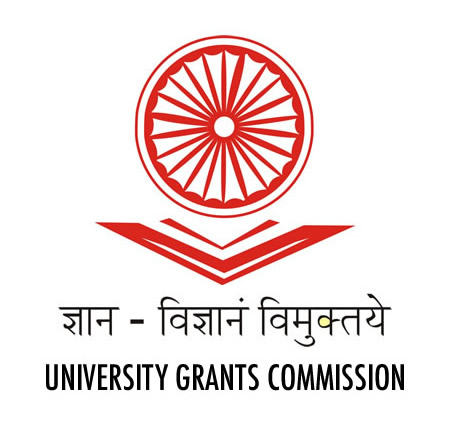
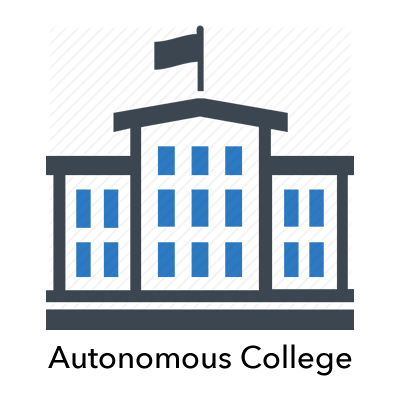
New Delhi, India, February 7, 2024 —
• The University Grants Commission (UGC) in India has instructed all affiliating Universities to comply fully with the University Grants Commission (Conferment of Autonomous Status upon Colleges and Measures for Maintenance of Standards in Autonomous Colleges) Regulations, 2023.
• In a letter addressed to the Vice-Chancellors, the UGC expressed its concern that several universities must respond promptly on the UGC portal when processing applications from affiliated colleges seeking the grant of autonomous status. The UGC requires universities to issue a notification within 30 days for a college to function as an autonomous entity once the UGC confers the Autonomous Status on the college.
• The UGC also noted that some Universities must grant autonomy to the autonomous colleges per the Regulations’ provisions. For instance, they need to allow the colleges to design syllabi, introduce new courses, and evolve methods of student performance assessment on their own.
• Additionally, the UGC has observed that some universities require colleges to agree with terms and conditions that do not conform to the UGC Regulations.
• The UGC will closely monitor the behavior of universities in this connection and take appropriate action as necessary.
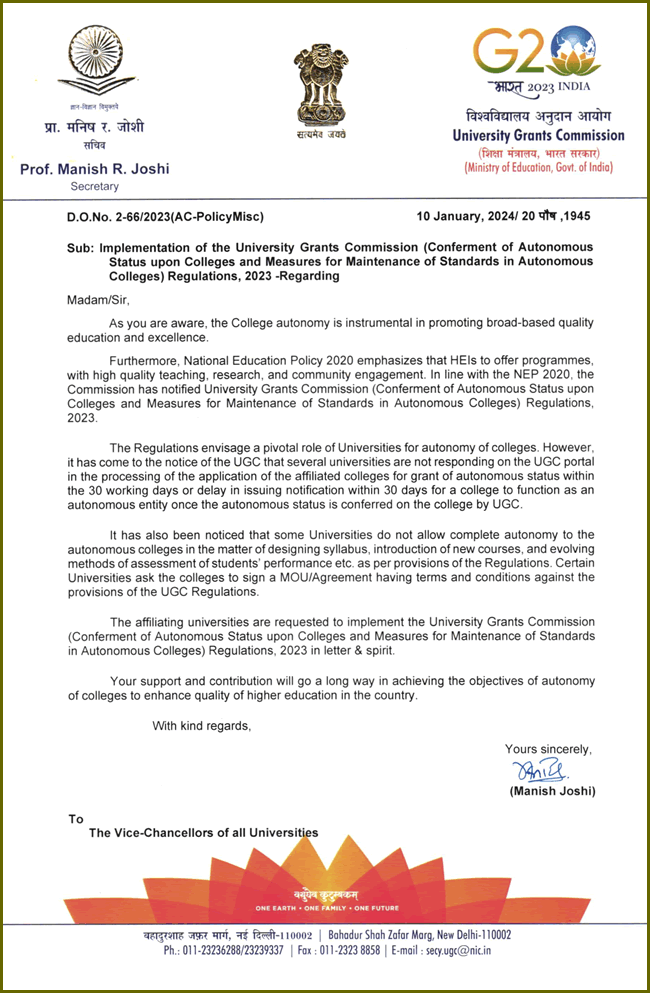
Photo: UGC India asks Universities to fully implement its Regulations on Autonomous Colleges and allow Affiliated Colleges to function as Autonomous Entities once the UGC has granted them Autonomous Status.
Source: The University Grants Commission (UGC)
|GlobalGiants.Com|
— The Editor is a Higher Education Professional.
Edited & Posted by the Editor | 1:13 PM | View the original post
- UPDATED -
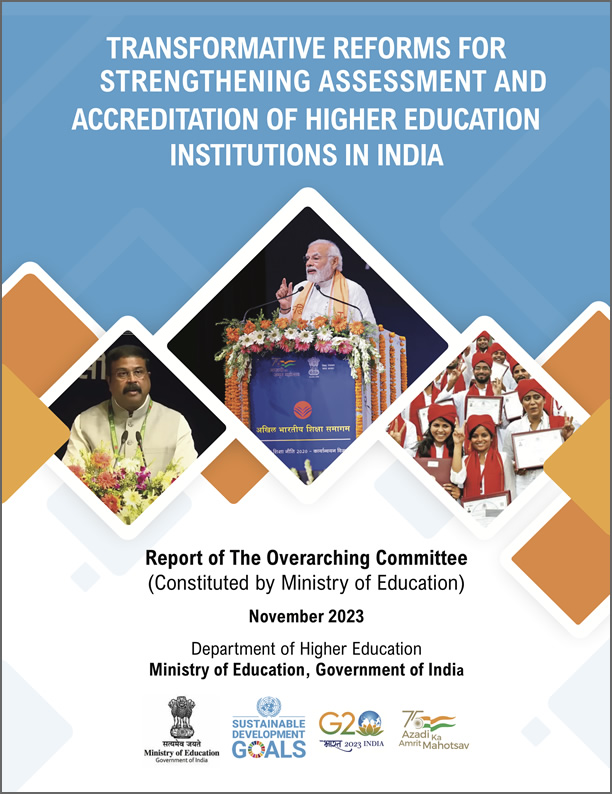
Photo: The Cover Page of the Report of the Overarching Committee constituted by the Ministry of Education.
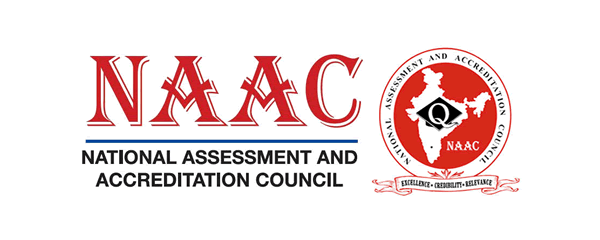
Attention: All Universities and Colleges in India!
You will soon receive one of the following two Tags:
Either “ACCREDITED” or “NOT ACCREDITED”
So get ready!
New Delhi, India, January 29, 2024 — The Ministry of Education of the Government of India has created a committee headed by Dr. K. Radhakrishnan, the former Chairman of ISRO. The committee has suggested comprehensive reforms to enhance the assessment and accreditation of higher education institutions in India.
The National Assessment and Accreditation Council (NAAC) plays a crucial role in assessing and accrediting higher education institutions in India. Their work is essential because it ensures that students receive a quality education and that universities and colleges meet specific standards.
NAAC has declared that they are implementing significant reforms in the accreditation process.
It has proposed reforms to improve the periodic approval, assessment, accreditation, and Ranking of all higher education institutions (HEIs) in India. These reforms aim to align with the vision of NEP 2020 and establish a simple, credible, objective, and rationalized system for approving, accrediting, and ranking HEIs. The system will be technology-driven, minimizing manual involvement to ensure transparency and integrate stakeholder inputs. The recommendations include mentoring and incentivizing programs encouraging HEIs to improve their accreditation levels, eminence, significance, and global recognition.
The recommendations for the Indian higher education system include the following:
Binary Accreditation (either Accredited or Not Accredited) rather than grades to encourage all the institutions to get board in the accreditation process, thereby creating a quality culture in the higher education system. The binary accreditation also aligns with the best practices of many leading countries worldwide.
Maturity-based graded accreditation to enable institutions to improve and position themselves globally.
Metrics will focus on processes, outcomes, and impact across different attributes of HEIs.
One Nation One Data Platform for integrity and transparency in handling institutional data.
Customized Ranking based on stakeholders such as industry, funding agencies, and students.
During its 104th meeting on January 27, 2024, the Executive Committee of the National Assessment and Accreditation Council (NAAC) decided that the recommended reforms would be implemented in two stages. In the first stage, binary accreditation will be executed within the next four months. In the second stage, maturity-based graded levels will be enforced by December 2024.
• It means that all universities and colleges in India will soon receive a tag indicating their accreditation status - either “Accredited” or “Not Accredited.”
By comprehensively implementing all the recommendations before the end of 2024, the Indian higher education system will transform and enhance the quality and credibility of Indian institutions, contributing to the socio-economic leadership of India.
Source: NAAC
|GlobalGiants.Com|
Edited & Posted by the Editor | 10:22 PM | View the original post
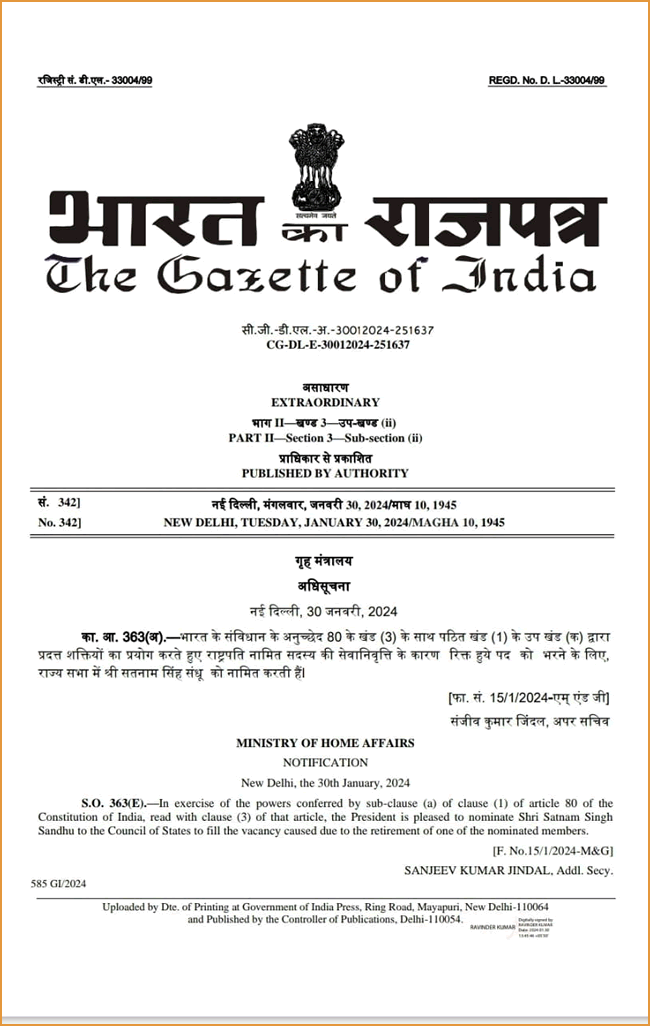
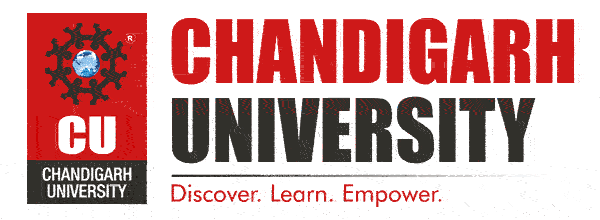
New Delhi, January 30, 2024 —Today, the President of India nominated Shri Satnam Singh Sandhu to the Rajya Sabha.
Satnam Singh Sandhu, the son of a farmer, is an accomplished educationist in India. He faced difficulties in pursuing education himself, being from an agricultural background. Therefore, he made it his mission to establish a high-quality educational institution, starting with the Chandigarh Group of Colleges (CGC) at Landran in Mohali in 2001. He then went a step further and founded Chandigarh University in 2012. The university has been ranked in the QS World Rankings 2023 and is the top private university in Asia.
Chandigarh University Chancellor Sandhu is also a philanthropist who has financially assisted countless students to pursue quality education. He is actively involved in community efforts to improve health and wellness and promote communal harmony through his two NGOs, the Indian Minorities Foundation and the New India Development (NID) Foundation.
In addition to his work in India, he has made significant efforts for national integration and worked extensively with the diaspora abroad.
Source: Ministry of Home Affairs
|GlobalGiants.Com|
Edited & Posted by the Editor | 5:53 PM | View the original post
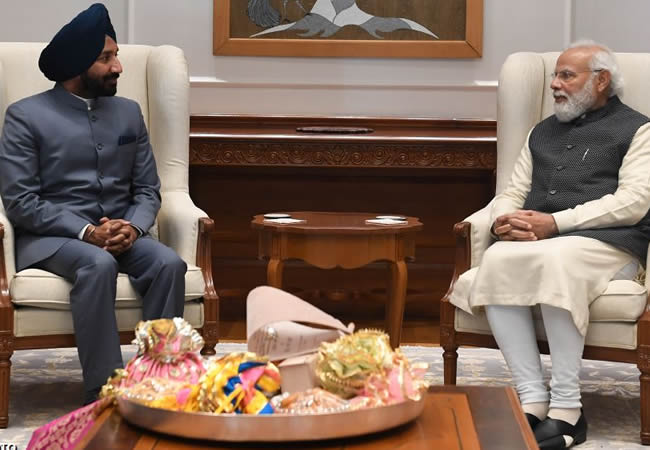

New Delhi, January 30, 2024 — The President of India has nominated Chandigarh University Chancellor, Shri Satnam Singh Sandhu, to the Rajya Sabha.
Prime Minister Modi was delighted after the President nominated Shri Satnam Singh Sandhu for the Rajya Sabha. Sandhu Ji is a distinguished educationist and social worker who has served people at the grassroots level in various ways, Mr. Modi said. He has always worked extensively to promote national integration and has also worked with the Indian diaspora, PM Modi added. The Prime Minister wished him the best for his parliamentary journey and expressed confidence that his views would enrich the Rajya Sabha proceedings.
The Vice President of India, Shri Jagdeep Dhankhar, expressed his warm welcome towards the nomination of Shri Satnam Singh Sandhu Ji as a member of the Rajya Sabha. He acknowledged his exceptional community service contributions and unwavering dedication to education, innovation, and learning. The Vice President believes that Shri Satnam Singh Sandhu Ji’s expertise and experience will immensely benefit the Rajya Sabha. He wished him all the very best for his tenure.
India’s Education Minister, Dharmendra Pradhan, also welcomed the nomination of Shri Satnam Singh Sandhu to the Rajya Sabha. He appreciated Sandhu’s contribution as a distinguished educationist, noted social worker, and expressed optimism that his presence in the August House will enrich it. The Minister wished him the best as Shri Sandhu embarked on a new journey of serving society.
Sources: Prime Minister’s Office; Chandigarh University
|GlobalGiants.Com|
Edited & Posted by the Editor | 7:34 AM | View the original post
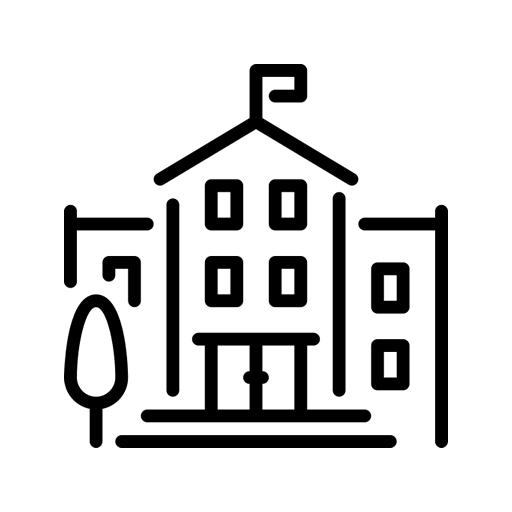
January 25, 2024
Attention, Vice-Chancellors of Universities in India!
If your University has not yet registered with the National Testing Agency (NTA) to participate in the Common University Entrance Test (CUET) for Postgraduate Admissions, you can apply to the NTA and join the system. It will enable your University to benefit from the CUET program and provide a fair and transparent entrance process for postgraduate students.
The University Grants Commission (UGC) and the Ministry of Education have entrusted the National Testing Agency (NTA) with the responsibility of conducting the Common University Entrance Test (CUET) for admission to postgraduate courses. This move aims to simplify the admission process and ensure equal opportunities for all students.
To add your University to the NTA’s list of participating institutions, you can register with the NTA. The NTA regularly updates the list of Universities on its website. After registration, it will soon include your University’s name on the list.
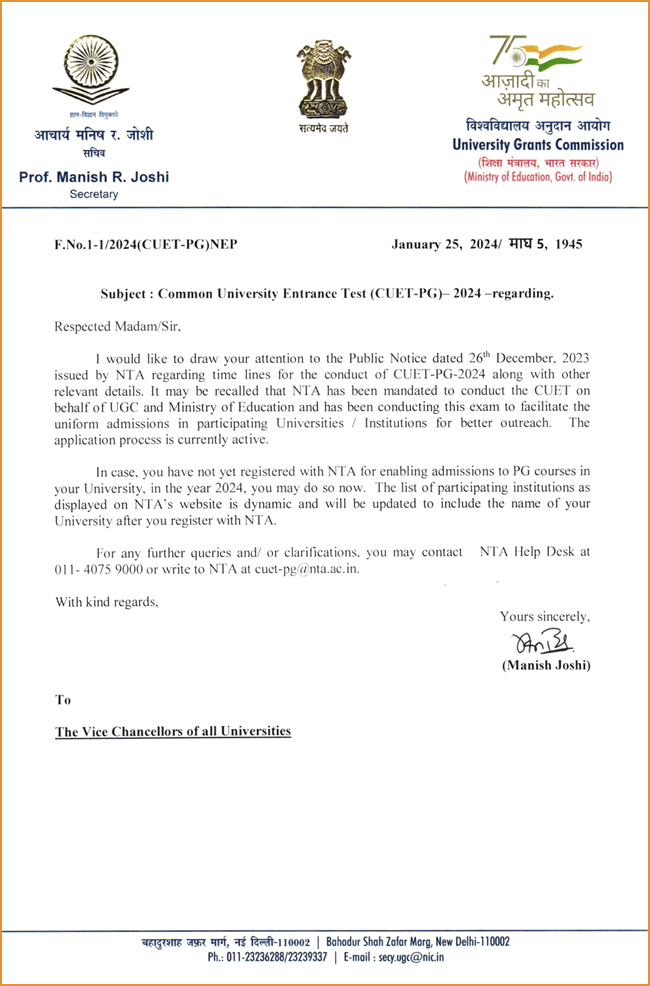
Photo: UGC advises the Vice Chancellors of Universities in India to register with the National Testing Agency (NTA) for the Common University Entrance Test (CUET) for Postgraduate Admissions.
Source: UGC
|GlobalGiants.Com|
— The Editor is a Higher Education Professional.
Edited & Posted by the Editor | 11:16 AM | View the original post
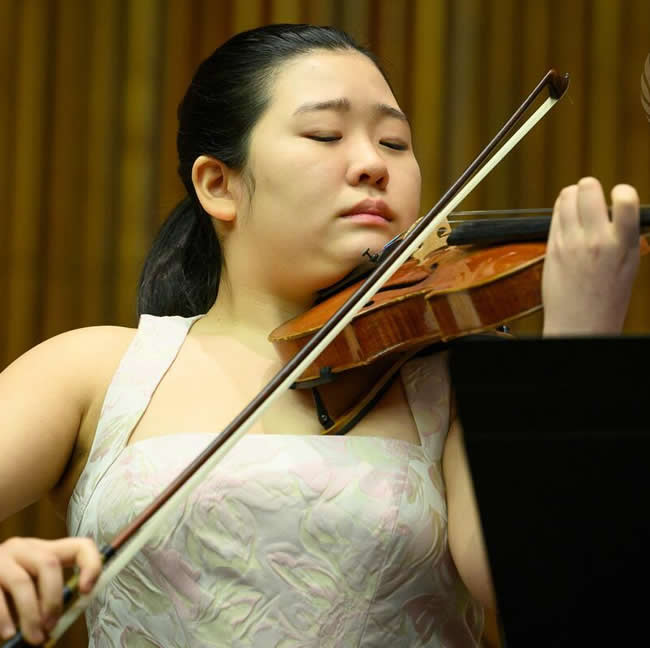
Photo: Jinan Lorenzio Wu from the Juilliard School in New York performs during the event “Learning for Lasting Peace” on the International Day of Education (January 24). United Nations Educational, Scientific and Cultural Organization (UNESCO) organized the event. January 24, 2024. New York. United States of America. UN Photo/Loey Felipe.
Source: United Nations, New York
|GlobalGiants.Com|
Edited & Posted by the Editor | 9:16 PM | View the original post
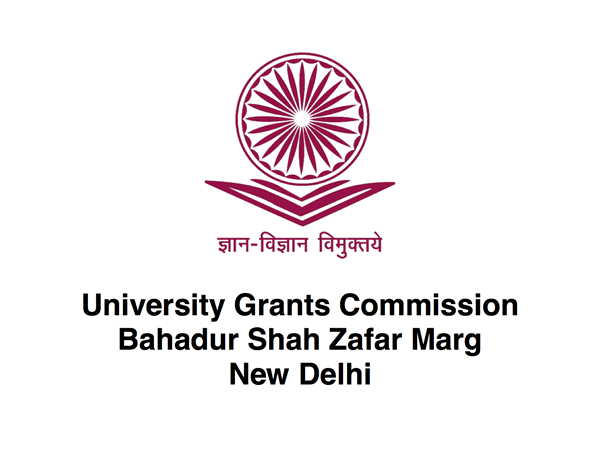
New Delhi, India, January 17, 2023 — The University Grants Commission (UGC) has released a PUBLIC NOTICE, which lists the Names of Universities that have failed to appoint Ombudspersons in compliance with the University Grants Commission Redressal of Grievances of Students Regulations, 2023.
On April 11, 2023, UGC notified the University Grants Commission (Redressal of Grievances of Students) Regulations, 2023, in the Official Gazette. Following this, the UGC sent a letter to universities on April 12, 2023, asking them to appoint ombudspersons within 30 days.
The list contains the names of more than 300 universities that have defaulted on appointing Ombudspersons per the regulations.
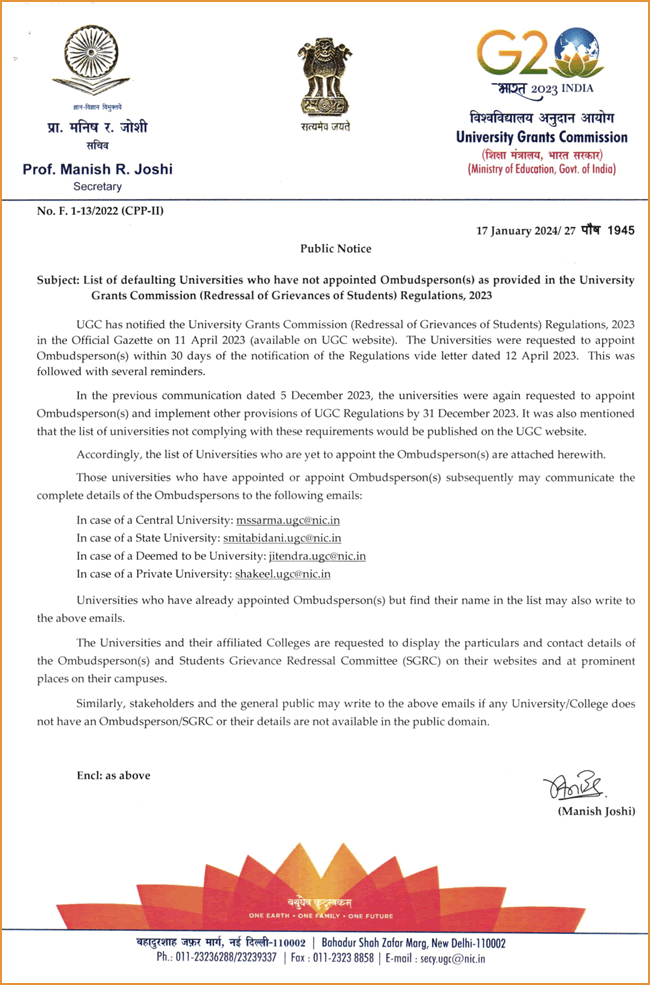
Photo: UGC Public Notice announcing the List of Defaulting Universities that have not appointed Ombudspersons in compliance with the University Grants Commission Redressal of Grievances of Students Regulations, 2023.
Source: UGC
|GlobalGiants.Com|
Edited & Posted by the Editor | 5:12 AM | View the original post


New Delhi, India, January 16, 2024 — The University Grants Commission has sent a letter to all university vice-chancellors recommending using ceremonial robes made of Handloom during convocations. The Commission has also advised the universities to become proud of their Indian heritage.
This initiative presents an excellent opportunity for the universities in India to demonstrate their commitment to Indian traditions and culture while supporting the handloom industry. By adopting this approach, universities can contribute to the country’s economic growth and promote sustainable fashion.
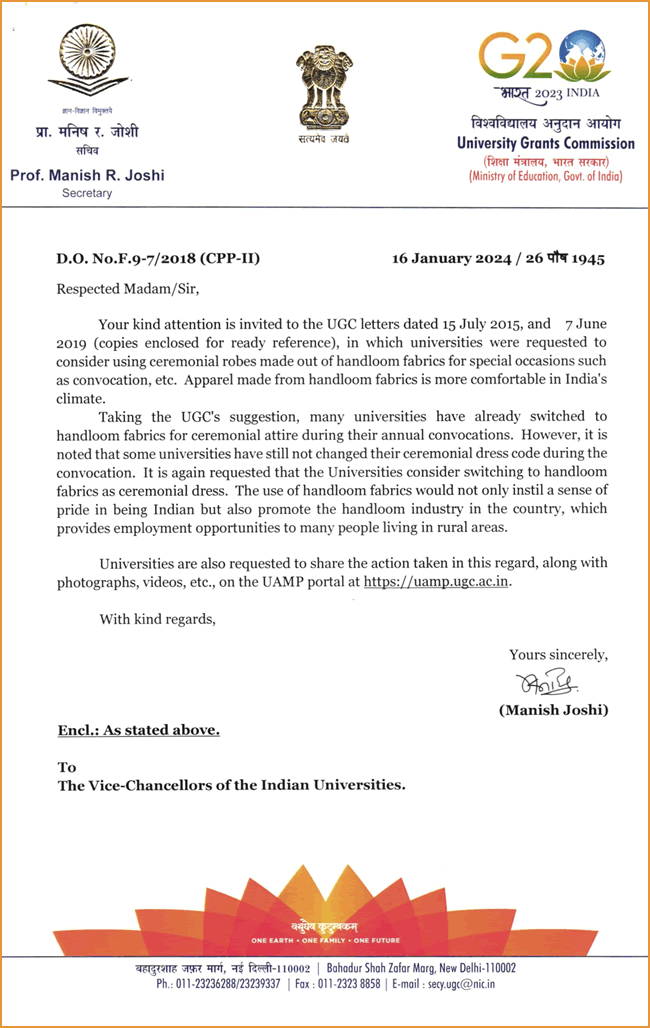
Photo: The letter from the UGC instructing the Universities in India to use Handloom Ceremonial Robes during Convocations and become Proud of their Indian Heritage.
Source: UGC
|GlobalGiants.Com|
Edited & Posted by the Editor | 1:51 PM | View the original post
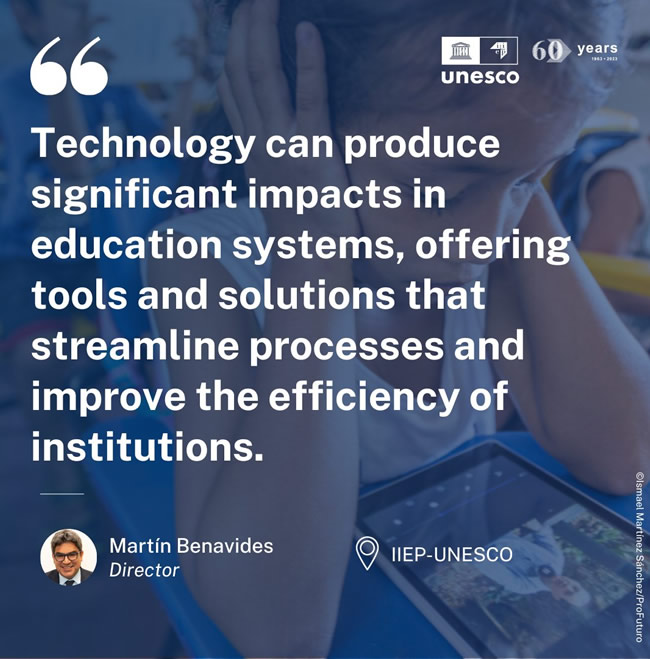
Paris, France, January 06, 2024 — Partnerships are crucial in transforming education, as no single institution can do it alone. They are essential to ensuring comprehensive educational planning and accountable, effective management.
• UNESCO IIEP (UNESCO International Institute for Educational Planning) is the only United Nations agency with the mandate to support countries with educational planning and management.
To celebrate the beginning of 2024, UNESCO-IIEP has identified five critical partnership areas. UNESCO-IIEP discussed these areas during five panels in its last Donors’ Day event, which brought together partners and beneficiaries. The event’s purpose was to reflect on the power of planning to address evolving country needs and global urgencies.
• Strengthening systems for sustainable planning
In the past two years, the International Institute for Educational Planning (IIEP) has supported 19 education sector analyses and plans, impacting the education of over 109 million children and youth.
These plans include simulation models, costed action plans, monitoring, evaluation, and learning frameworks. IIEP works with education actors at both centralized and decentralized levels to ensure that the process is nationally-led and participatory. This approach helps create a long-term and sustainable plan for effective implementation.
Global Campus: To strengthen this system further, IIEP will launch a new Global Campus in 2024, including all its training programs and courses and a new micro-credential and diploma system.
• Taking gender equality to the next level
The Gender at the Centre Initiative (GCI) promotes gender equality in sub-Saharan African countries. The program has supported eight countries over four years, establishing alliances within ministries to integrate gender equality into policies and plans.
The first phase ended in 2023, and a second phase was launched with renewed funding to consolidate progress.
• Making education a critical solution to the climate crisis
IIEP integrates climate action into planning, collaborating with more countries to implement adaptation and environmental sustainability measures.
As part of the GPE initiative, they will provide climate-smart education system reforms emphasizing disaster risk reduction, cross-sectoral coordination, and climate-relevant training.
• Fostering south-south collaboration and sharing evidence
IIEP’s Office for Latin America and the Caribbean has pioneered virtual Communities of Practice for education stakeholders to exchange knowledge and develop expertise.
This network will be replicated globally in 2024 to enhance knowledge exchange in planning and management.
• Forging new partnerships for broader impact
The last UNESCO-IIEP symposium underscored the importance of new partnerships and strategic alliances to address emerging and long-standing challenges.
UNESCO-IIEP’s most recent collaborations include support for the 2024 Education Leadership Seminar and research on the middle tier, digital tools for accountability, and narrowing learner gaps.
Source: UNESCO IIEP
|GlobalGiants.Com|
— The editor is a Higher Education Professional with UNESCO IIEP certification.
Edited & Posted by the Editor | 5:19 AM | View the original post

New Delhi, India, January 03, 2024 — The University Grants Commission (UGC) has warned all universities in India against collaborating with foreign higher education institutions that the Commission does not recognize.
The UGC has observed that some universities are attempting to partner with foreign educational institutions that the Commission does not recognize. The UGC does not acknowledge such partnerships, and the Commission will not recognize any degrees conferred following such arrangements.
• In addition, all such collaborations must comply with “The University Grants Commission (Academic Collaboration between Indian and Foreign Higher Education Institutions to offer Twinning Programme, Joint Degree, Dual Degree Programmes) Regulations, 2022.”
Further, the University Grants Commission (UGC) has warned students and the public that opting for programs and degrees that do not have UGC recognition will result in consequences.
Furthermore, the UGC has alerted that it will take action against all defaulting Universities in India under applicable laws, rules, and regulations.
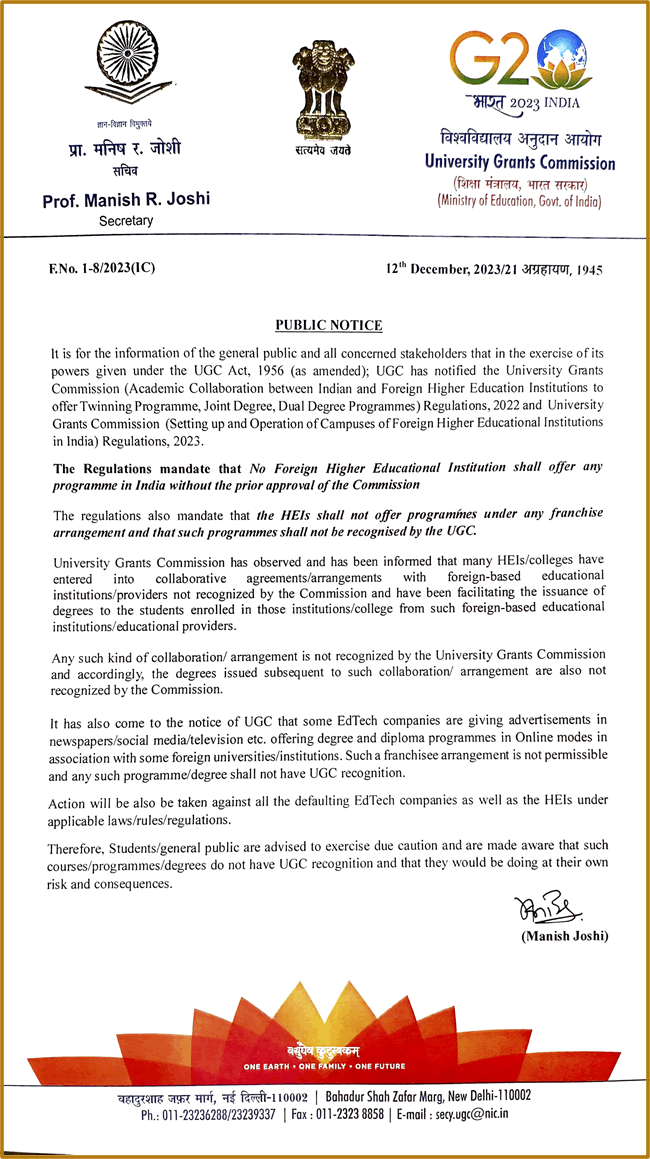
Photo: The University Grants Commission (UGC) warns Universities in India against collaborating with Foreign Higher Institutions not recognized by it. The UGC has alerted that it will take action against all defaulting Universities.
Source: UGC
|GlobalGiants.Com|
Edited & Posted by the Editor | 3:01 PM | View the original post
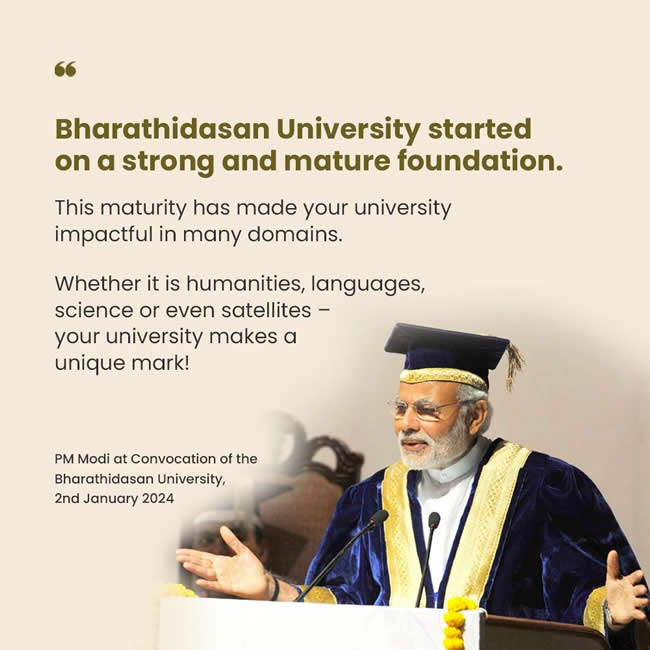
Photo: Prime Minister Modi attends the 38th Convocation Ceremony of Bharathidasan University at Tiruchirappalli, in Tamil Nadu, on January 02, 2024.
New Delhi, January 02, 2024 — Shri Narendra Modi, the Prime Minister of India, delivered a speech at the 38th Convocation Ceremony of Bharathidasan University in Tiruchirappalli, Tamil Nadu. During the ceremony, he congratulated the graduating students, their teachers, and parents and awarded the meritorious students of the University.
The Prime Minister highlighted the event’s significance, as it was his first public interaction of 2024. He expressed his happiness in being present in the beautiful state of Tamil Nadu and among the youth. Additionally, he mentioned that it was an honor for him to be the first Prime Minister to grace the convocation ceremony at Bharathidasan University.
The Prime Minister stressed the importance of knowledge and education in Indian civilization, citing ancient universities such as Nalanda, Takshila, Kanchipuram, Gangaikonda Cholapuram, and Madurai. He also quoted Gurudev Rabindranath Tagore, saying that education teaches us to live in harmony with all existence.
The Prime Minister urged the graduating students to ponder deeply about the purpose of education and how they can utilize it for societal benefit. He underlined the importance of giving back to society and working towards building a better country. He also acknowledged the role of the entire society in bringing the students to this day.
Source: Prime Minister’s Office
|GlobalGiants.Com|
Edited & Posted by the Editor | 3:07 PM | View the original post
— UPDATED —

New Delhi, December 26, 2023.
The University Grants Commission (UGC) in India has issued a PUBLIC NOTICE declaring that the M.Phil. degree is not recognized in the country. This announcement is per clause 14 of the University Grants Commission (Minimum Standards and Procedures for Award of Ph.D. Degree) Regulations, 2022. It means that the M.Phil. degree is discontinued.
• Universities must immediately halt admissions to their M.Phil. programs, and students should refrain from applying for admission to them.
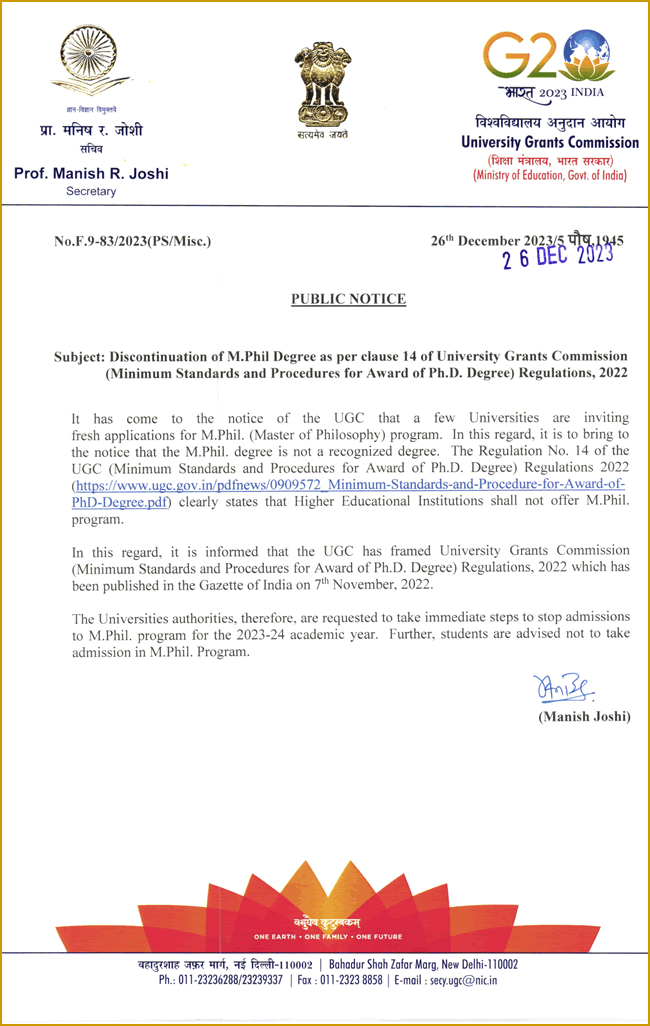
Photo: The UGC PUBLIC NOTICE declaring that the M.Phil Degree is not Recognized.
— UPDATE —
December 28, 2023
• The University Grants Commission (UGC) has formed a Standing Committee to oversee whether universities comply with the UGC regulations in awarding Ph.D. degrees.
Upon initial review, the University Grants Commission (UGC) has decided to prohibit Ph.D. programs offered by OPJS University. The UGC has announced through a PUBLIC NOTICE that OPJS University can no longer enroll scholars in its Ph.D. programs. As a result, any Ph.D. awarded by the University will not be recognized and will be considered invalid for higher education and employment purposes.
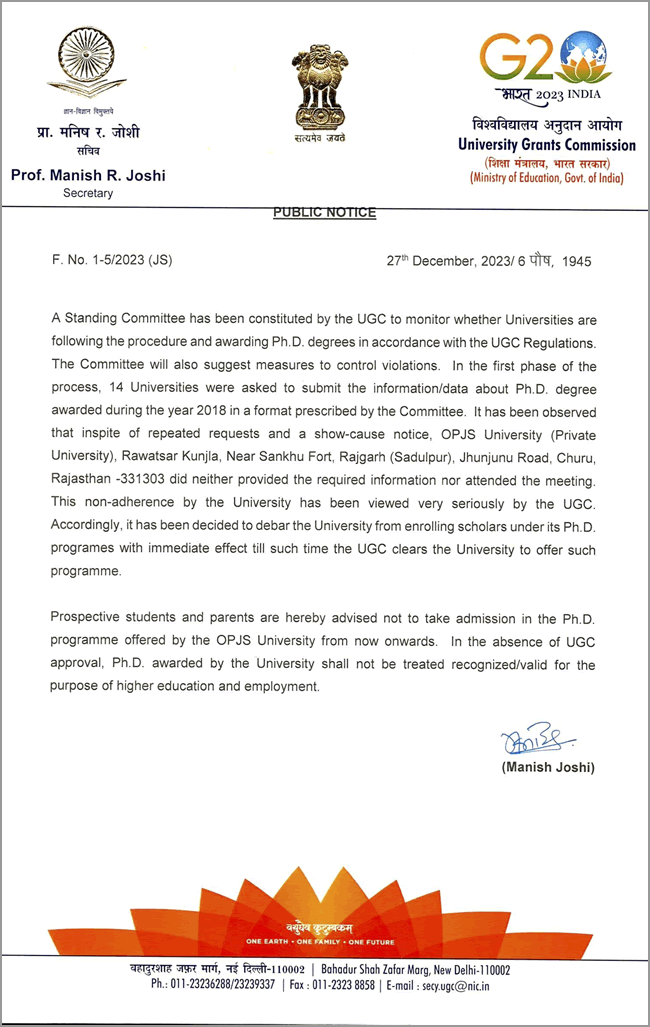
Photo: The UGC Public Notice declares that any Ph.D. degree awarded by OPJS University will not be recognized or considered valid for higher education and employment.
Source: UGC
|GlobalGiants.Com|
Edited & Posted by the Editor | 2:18 PM | View the original post
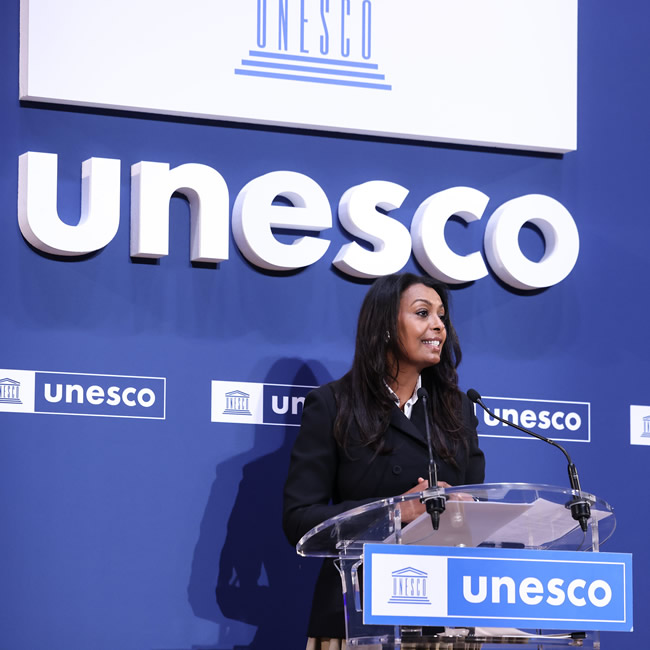
Photo: A speaker at the “(Re)thinking Common Good, Acting Together” high-level discussion at the UNESCO Headquarters in Paris. Image provided by & copyright © UNESCO/Marie ETCHEGOYEN.
Paris, December 23, 2023 — Eighty-three teams of university students and their mentors from 19 countries are the first winners of the Future Designer International Innovation Design Awards at the Science for the Sustainable Development Goals Innovation Contest.
The winning designs range from an Air Ionizing-Humidifier with an Indoor Air Pollutant Detector to a solar-powered public bench, reusable LED bulbs and tubes with a replaceable cartridge, and sustainable fashion in the form of bags made from ‘green’ materials that are produced using a three-dimensional (3D) printer.
Ralph Benedict Capili developed the humidifier with his mentor, Evelyn Marinas, from the University of Doha for Science and Technology in the Philippines. SolSeatz, the solar-powered public bench, is the brainchild of Saber Aragh and his mentor, Hamid Naghd Bishi, from the Pars University of Architecture and Art in Iran. Shreya Chopra and her mentor Nanita Chopra from Amity University Noida in India won a silver award for GLED, the reusable LED bulbs and tubes. Eszter Borsodi and her mentor Tamasi Kinga from the University of Miskolc in Hungary produced the sustainable fashion.
Another team of five students from the Universitat Politecnica de Valencia in Spain designed a self-regulating nest for sea turtles.
About 30% (25) of the 83 teams won gold awards. Another 29 teams won silver and 29 bronze awards. Each winning team will receive a certificate.
The 83 winning teams come from the following 24 countries: Argentina, Austria, Belarus, China, Costa Rica, Hungary, India, Indonesia, Iran, Kenya, Malaysia, Mexico, Morocco, Philippines, Japan, Rwanda, Spain, Sri Lanka, Russian Federation, Ghana, Kenya, Palestine, Kazakhstan, and Ukraine.
Unesco selected the winning teams from over 1,500 applications from 48 countries, with 228 entries advancing to the final evaluation stage.
The awards were open to undergraduate and postgraduate students worldwide. The aim was to solicit innovative, creative works from young people worldwide to raise awareness of the critical role that Science, technology, engineering, and mathematics play in achieving the Sustainable Development Goals.
Source: UNESCO
|GlobalGiants.Com|
— The Editor is a Higher Education Professional & Consultant with diverse certifications from the world’s top institutions, including the UNESCO International Institute for Educational Planning Paris, Universities of Harvard, Oxford, Cornell, UC Berkeley, Dartmouth, International Monetary Fund, and the World Intellectual Property Organization Academy, Geneva.
Edited & Posted by the Editor | 7:22 PM | View the original post

Photo: Deakin University Campus in GIFT City, Gujarat, India. Image provided by & copyright © Deakin University.
GANDHINAGAR, India, Dec. 21, 2023 — Deakin University, one of the top-ranked universities globally, is all set to launch its GIFT City Campus in India in January 2024. The campus will be the first-ever international university to set up a base in India. It will offer in-demand courses, such as Master of Business Analytics and Master of Cyber Security (Professional), to equip graduates with future-ready skills. The campus is located strategically in India’s emerging biz-tech district and will offer students unprecedented collaborative opportunities and hands-on industry experience. The courses offered at GIFT City align with Australia’s national accreditation body, the Tertiary Education Quality and Standards Agency (TEQSA). With this initiative, Deakin University is committed to making international standards of learning and skilling accessible to Indian students.
Deakin University is a public university located in the state of Victoria, Australia. It was established in the year 1974.
Source: Deakin University
|GlobalGiants.Com|
Edited & Posted by the Editor | 10:29 AM | View the original post
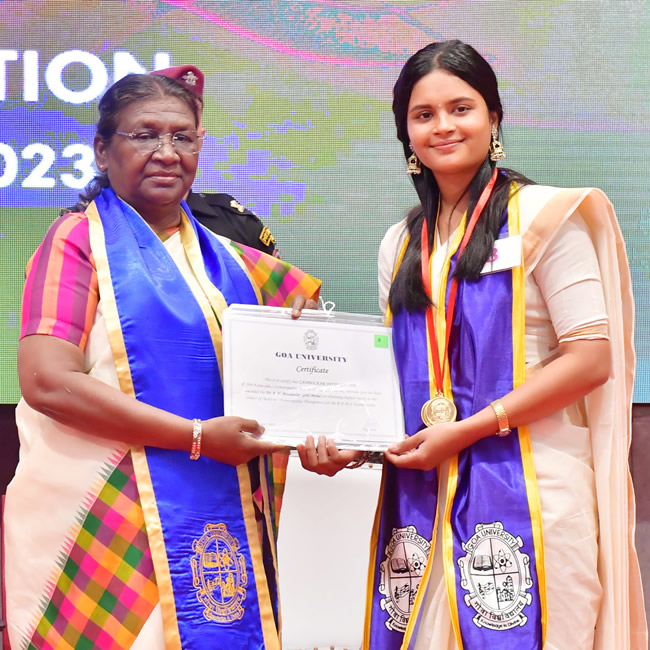
Photo: The President of India, Smt Droupadi Murmu, graced the 34th Convocation of Goa University on August 23, 2023 [File Photo].
New Delhi, December 21, 2023 — The President of India, Draupadi Murmu, attended the 69th convocation of IIT Kharagpur on December 18, 2023, and delivered a speech.
The President emphasized that the Indian Institutes of Technology (IITs) are globally recognized as centers of excellence in talent and technology. She praised IIT Kharagpur for being the country’s first IIT and nurturing great talents over its 73-year journey. Additionally, the President acknowledged that IIT Kharagpur’s contribution to the country’s development is unmatched.
The President was happy to know that IIT Kharagpur is working towards forming partnerships and collaborations with other global institutions as part of the Indian Government’s policy to internationalize and globalize IITs. She believes this move will help establish IIT Kharagpur internationally and play a significant role in getting global recognition for the Indian education system.
The President pointed out that despite India having the oldest knowledge tradition in the world, not even a single educational institution from the country is ranked among the top 50 educational institutions globally.
She stated that though good education is more critical than race for ranking, good ranking attracts students and good faculty from all over the world and enhances the country’s reputation. She emphasized that IIT Kharagpur, the country’s oldest IIT, should try this direction.
The President emphasized the crucial role institutions such as IIT Kharagpur can play in making 21st-century India a hub of innovation and technology. She urged them to create groundbreaking efforts to develop and implement new technology.
Source: President’s Secretariat
|GlobalGiants.Com|
Edited & Posted by the Editor | 7:35 AM | View the original post
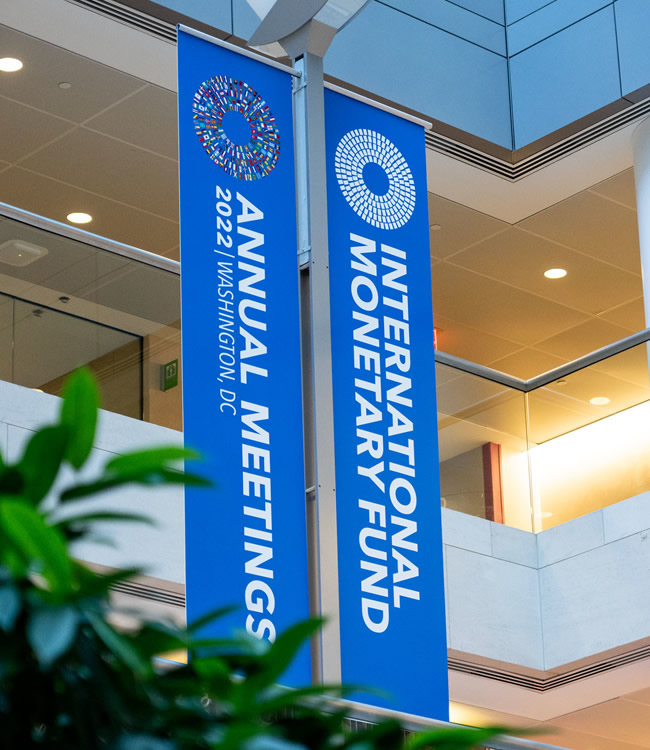
Photo: During the 2022 Annual Meetings at the International Monetary Fund, a behind-the-scenes look at the first day. Washington, DC, United States. October 10, 2022. IMF Photo/STEPHEN VOSS. [File Photo]
Washington, DC, December 19, 2023 — The International Monetary Fund (IMF) has concluded its yearly consultation with India. IMF noted that India’s economy has grown robust over the past year, with employment surpassing pre-pandemic levels, formalization progressing, and the financial sector remaining resilient. The current account deficit widened in 2023 as domestic demand and external shocks outweighed robust services exports and proactive diversification of critical oil imports. Despite this, growth is expected to remain strong, with real GDP projected to grow 6.3 percent in 2024 and 2025. However, risks to the outlook are balanced, with a sharp global growth slowdown and further global supply disruptions cited as potential challenges.
Executive Directors commended India’s authorities for their prudent macroeconomic policies and reforms that resulted in the country’s strong economic performance, resilience, and financial stability. They called for appropriate policies to sustain economic stability and further progress in critical structural reforms to unleash India’s significant potential.
The International Monetary Fund (IMF) directors also praised the Reserve Bank of India’s (RBI) efforts to maintain economic stability through proactive monetary policy actions and a solid commitment to price stability. They agreed that the current neutral monetary policy stance, based on a data-dependent approach, is appropriate and should gradually help bring inflation back to its target level.
The International Monetary Fund (IMF) annually conducts bilateral discussions with member countries to gather economic and financial information. During these discussions, officials discuss the country’s economic developments and policies. The IMF staff then prepares a report, which the Executive Board discusses. The Managing Director summarizes the views of the Executive Directors and transmits them to the member country’s authorities.
Source: IMF
|GlobalGiants.Com|
— The editor holds an Academic Certificate in Financial Market Analysis from the Institute for Capacity Development at the International Monetary Fund in Washington, DC.
The number of people in the labor force is generally closely related to whether an economy is growing at a reasonable rate. We explain unemployment in this video. https://t.co/kGB0Uom1lW pic.twitter.com/T2rohzC7PK
— IMF (@IMFNews) December 8, 2023
Edited & Posted by the Editor | 2:33 PM | View the original post
 |
 |
